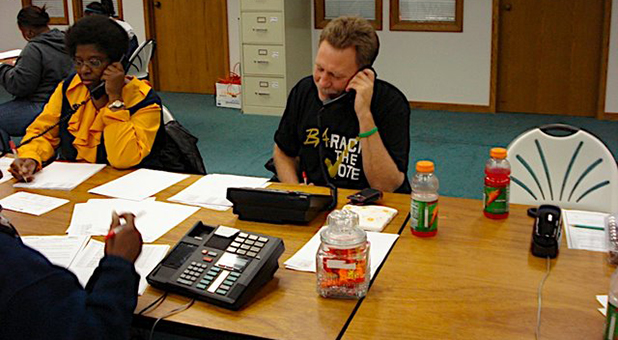This Is What Opinion Polls Do
A new Indianapolis Star poll, conducted with Ball State University, shows 50.2 percent of people in Indiana support providing special nondiscrimination protections based on sexual orientation and gender identity in Indiana’s laws. Reportedly, only 35.1 percent are opposed. That is par for the course on LGBTQ issues, but vote results consistently invalidate such polls, which raises the question: Is the purpose of polling data to convey the views of a representative sample or to engage in marketing tactics to sway views?
Argumentum ad populum is Latin for the idea that because many people believe something to be true, it is true. Closely related is the bandwagon effect in marketing, where marketers attempt to persuade people to purchase their goods and services by claiming “everyone else is doing it.” These strategies aren’t just used to sell goods and services—they are also used to sell politicians and policies.
What’s the best way to show that “everyone else” supports the candidate or legislation? Polling. When polls show a majority of folks favor a policy or candidate, it marginalizes those who disagree with the poll, peer-pressuring them into conformity by making them think their opinions are unpopular, invalid or irrelevant.
The problem, however, is that polling seems to be increasingly skewed in favor of a particular agenda. Can you remember the last time the mainstream media reported a poll on social issues showing a conservative idea winning?
Witness the Growth in Inaccurate Reporting
Recently in Houston, Texas, a proposition that would allow men to use women’s bathrooms failed by nearly 2 to 1 (61 percent to 39 percent). This is despite the fact that polls reported significant support for the proposition in the weeks and months leading up to the vote. In fact, a Houston Association of Realtors poll showed 15 percent more Houston voters supported the proposition than opposed it. Obviously, these polls were grossly inaccurate.
The recent race for Kentucky governor also reflected the same inaccurate polling. The Huffington Post, which unapologetically leans liberal, showed the liberal leading the conservative, who vocally supported Kim Davis, the clerk who declined to issue same-sex marriage licenses, by about 2.1 percent. Other polling showed the liberal leading by as much as 5 percent. While the race was tight, the conservative ended up with the support of 53 percent of Kentucky voters, while the liberal only secured 44 percent. The conservative candidate won by 9 points.
Inaccurate polling is not a new phenomenon. Similar polling data was consistently at odds with actual votes cast on marriage referenda across the country. For example, in 2012, North Carolinians voted on a constitutional amendment to define marriage as the union of one man and one woman. Prior to that vote, polls had shown a majority of North Carolinians opposing the amendment, and some polls showed same-sex marriage support by upwards of a 25 percent margin. However, on election day, the amendment passed 61 to 39 percent, by a 22-point margin!
Beware the Push Poll
With polling quite obviously failing to reflect the actual views of voters, the question is: What is the purpose of circulating the polling results? Could it be to convince voters and donors that if they’re not in tune with the liberal agenda, they’re out of step with popular views regarding natural marriage and conservative candidates who voice outspoken support for natural marriage?
These days, polls seem to endeavor to impact voters rather than reflect voters’ intentions, touting an “everybody else is doing it” mindset. This intends to deflate conservatives who support natural marriage, encouraging them to stay home from the polls because their policies and their candidates are so unlikely to prevail—based on polls, of course.
Liberals are well-aware of the conservative views of a vast majority of Americans; that is why they’ve changed course. Instead of allowing Americans to vote on questions like the bathroom ordinance in Houston and the marriage amendments, they’re urging local governments to pass ordinances and asking federal, unelected judges to decide important questions, like the marriage question, which the Supreme Court answered in Obergefell v. Hodges in June 2015.
It is now more important than ever for Americans to commit to getting out to vote, despite what the polls are reporting. Elections have consequences, and we are all responsible for stewarding our voting rights by showing up and voting for conservative principles, to spite the polls.














































